Hotel Berlin

Brief Synopsis
Cast & Crew
Peter Godfrey
Faye Emerson
Helmut Dantine
Raymond Massey
Andrea King
Peter Lorre
Film Details
Technical Specs

Synopsis
In 1945, Nazi soldiers search a Berlin hotel for doctor Martin Richter, an escapee from a concentration camp. Richter pretends to be a waiter delivering a meal to Nazi actress Lisa Dorn. Lisa is suspicious of his behavior but believes him to be an undercover Gestapo man. Meanwhile, facing military defeat, some highly placed Germans make plans to steal a submarine and escape to South America. Armin Van Dahnwitz, who was part of a conspiracy to kill Hitler, is warned by his friend, Baron Von Stetten, that as the last remaining conspirator, he must take the honorable route of suicide. Instead Van Dahnwitz readies his airplane and asks Lisa to fly that night with him to Sweden. Explaining that her work keeps her in Berlin, Lisa refuses and also turns down his marriage proposal. Learning that a waiter who aided him has been captured, Richter tries to escape. Lisa has discovered his true identity, but Richter offers to help her leave Germany with the help of the resistance if she will help him leave the hotel. When Lisa leaves for the theater, Richter crawls through the window of her room and enters the room of fellow Dachau prisoner, Johannes Koenig, a Nobel prize winning scientist. Koenig's experiences have affected his mind, and when Richter speaks enthusiastically of Germany's approaching defeat, he reveals that the Nazis have offered to set up a laboratory for him in South America. Richter argues that it will merely be a front for the Nazi underground. While they talk, Tilli Weiler, the hotel hostess, and a maid explore Lisa's suite and find a jacket that Richter left behind. Hoping to obtain the reward for Richter's capture, Tilli reports to Commissioner Joachim Helm but receives nothing. She leaves his office and finds Mrs. Bauer, the mother of her Jewish fiancé Max, waiting for her. Mrs. Bauer tells Tilli that Max did not die in the concentration camp, but was liberated by American soldiers. Back in her room, Lisa finds Richter dressed in a Nazi uniform. Eavesdropping at her door, Helm learns that she is planning to leave and enters her room, where he finds Richter. The two men struggle and Richter kills Helm. Learning that he will not be able to escape the S.S., Van Dahnwitz shoots himself. In the meantime, the Nazis have found Helm's body and send a troupe of S.S. to surround the hotel. By pretending that Richter is drunk, Lisa gets him outside the hotel, but when Von Stetten tells her that the Gestapo think she was involved in Helm's murder, she offers to trade Richter and his knowledge of the underground for a safe passage out of Germany. Members of the underground kidnap Lisa and bring her to their headquarters, where Tilli, Mrs. Bauer and a reformed Koenig wait to leave the country. Shocked by Lisa's betrayal, Richter shoots her. As the Nazis prepare to leave the hotel, an Allied bomb squad passes overhead.

Director

Peter Godfrey
Cast
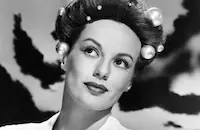
Faye Emerson

Helmut Dantine
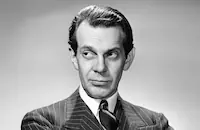
Raymond Massey

Andrea King

Peter Lorre

Alan Hale

George Coulouris
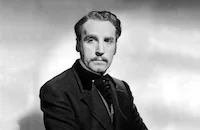
Henry Daniell
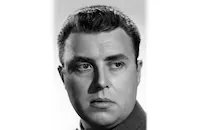
Peter Whitney
Helene Thimig

Steven Geray

Kurt Kreuger
Paul Andor
Erwin Kalser
Dickie Tyler
Elsa Heims
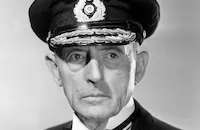
Frank Reicher

Paul Panzer
John Wengraf
Ruth Albu
Jay Novello
Torben Meyer
Johanna Hofer
George Suzanne
Fred Wolff
Kurt Neumann
Hans Carl Ludwig
Arno Frey
Patricia Clarke
Wing Foo
Fred Essler
George Meader
Frank Alten
Peter Pohlenz
John Sheridan
John Miles
John Meredith
Lottie Williams

Jack Mower
Leo White
Gloria Faythe
Margaret Story
Lucy Von Boden
Betty Chay
Yvonne Hekren
Eugene King
Jack Martin
Adolph Milar
Alfred Stury
Fred Giermann
Fred Nurney
Walter Bonn
Robert Stephenson
Carl Ekberg
Harold Ramond
Hans Furberg
Hans Von Morhart
Charles Faber
Crew
Gerald W. Alexander
Claude Archer
Trude Berliner
Alvah Bessie
Paul Detlefsen
Louis F. Edelman
Leo F. Forbstein
Charles David Forrest
Jack Gage
Carl Guthrie
John Hughes
Lou Jennings
Charles Lang
Roger Neury
Jo Pagano
Peter Pohlenz
Leonid Raab
Leah Rhodes
Robert Rhodes
Frederick Richards
Eric Stacey
Clarence Steensen
Jack L. Warner
Franz Waxman
Robert G. Wayne

Film Details
Technical Specs

Articles
Hotel Berlin
Or so you thought. Baum was an Austrian Jew who'd lived in Germany and emigrated to the U.S. just as the Nazi Party was rising to power. She apparently felt no need for broad-brush stereotypes, and neither does Hotel Berlin remarkably, here we have one of the very few Hollywood films made and set during WWII in which every single character, sympathetic, villainous or caught somewhere in the middle, is German. We're not talking about the refugee German Jews of Frank Borzage's The Mortal Storm (1940), which was set safely during the Reich's rise, but rather Germans enduring the weft of Berlin life well into the war, during the Allied bombing, in cahoots with or merely tolerating the Nazis, smuggling freedom fighters or ratting on black marketeers, exploiting the military for one's own purposes or ignoring it altogether. In fact, the film actively quotes both Roosevelt and Churchill in making its case that the German people in general should not be considered culpable for the Nazi crimes but regarded as victims as well.
It's a moral dilemma that's still hot to the touch in European cultural discourse, but Hotel Berlin gives extraordinary depth and empathy to every German on its docket, from Raymond Massey's heartsick Nazi general marked for execution because of an anti-Hitler plot, and Faye Emerson's self-hating bar-tramp/informer, to Peter Lorre's nihilistic alcoholic doctor, Helmut Dantine's single-minded Resistance fighter (almost as cold-blooded as the Fascists!), Andrea King's narcissistic theater star and even George Coulouris's rat-sniffing Nazi officer. The situation is both cynical workaday chaos a la Casablanca (the trips to the bomb shelter only interrupt drinking and dancing), and ripe with tension the officers (including Alan Hale as a domineering buffoon) know the war is winding down ("It doesn't matter now" is a common conversation ender), and are scrambling to flee the continent before the ceiling falls in. Into the fray comes Dantine's wanted rogue, hiding in closets and masquerading as an officer, as well as, remarkably, a fear-eyed Jewish refugee from Emerson's past, played delicately by the legendary Helen Thimig, wife of emigrated Austrian theater pope Max Reinhardt.
Godfrey, a Brit who left behind an undistinguished filmography of Warner B-movies and TV episodes, kept his camera moving throughout Hotel Berlin, but what's more his touch with the cast is uniform, touching and humane. Though King and Emerson have their clumsy, second-rate-starlet-for-a-reason moments, and Dantine is as stiff and reserved as he was as the angsty Hungarian refugee in Casablanca, the otherwise veteran cast is coaxed into dignified subtlety. Massey, truly a Golden Era master incapable of a misjudged line or unintelligent reading, is no surprise, but watch Henry Daniell, a too-often villainous character star usually nudged toward lizardy evil, quietly fill out the role of the doomed man's fellow officer, constantly bringing him bad official news and bearing a guilt-stricken friend's burden like a soldier. Still, the centerpiece of Hotel Berlin might belong to Lorre, who has an enormous, seven-minute scene in which his booze-sodden man of science debates with Dantine's idealistic rebel about the usefulness of fighting, and the hopelessness of being German, in the face of so much malice and death and suffering. "Good Germans?" he cries at one point, looking around the hotel room, "Where? Where are they? Hello?"
It's not surprising that one of the adapting screenwriters was Alvah Bessie, a devoted Communist and one of the famed Hollywood Ten; nobody knew how to craft startlingly fresh humanistic characters, jets of dialogue, and three-dimensional sympathies within the studio system like the old-school, labor-union-culture liberals, a category that includes blacklistees Dalton Trumbo, Ring Lardner, Jr. and Abraham Polonsky. But Hotel Berlin was also surprisingly timely for most of the world in early 1945 the concentration camps were still just a rumor, but here characters talk in ominous terms about Dachau and Birkenau, whose gas chambers could kill "6,000 people in 24 hours!", in a movie that hit theaters one month before Auschwitz and Dachau were liberated and exposed to the world. Even the typical Warner clutter evoking a bombed-out luxury hotel that must be held up by support beams echoes the characters' moral ambiguities and troubled moment in what was, of course, the century's most wracked mortal conflict. You won't see another movie made on American soil that so dares to sympathize with Nazi Germany and attends to its dread of the war's end, and its day of reckoning.
Producer: Louis Edelman
Director: Peter Godfrey
Screenplay: Alvah Bessie, Jo Pagano; Vicki Baum (novel)
Cinematography: Carl Guthrie
Art Direction: John Hughes
Music: Franz Waxman, Paul Dessau (uncredited)
Film Editing: Frederick Richards
Cast: Faye Emerson (Tillie Weiler), Helmut Dantine (Martin Richter), Raymond Massey (Arnim von Dahnwitz), Andrea King (Lisa Dorn), Peter Lorre (Johannes Koenig), Alan Hale (Herman Plottke), George Coulouris (Joachim Helm), Henry Daniell (Von Stetten)
BW-98m. Closed captioning.
by Michael Atkinson

Hotel Berlin
Quotes
Trivia
Notes
The opening title card reads "Warner Bros. Pictures presents Vicki Baum's Hotel Berlin." The film's working title was Hotel Berlin '43. The film ends with the following written quotation signed by the Allied leaders, Winston Churchill, Franklin D. Roosevelt and Joseph Stalin: "Our purpose is not to destroy the German people-but we are determined to disband all German armed forces-break up the German General Staff-eliminate all German industry used for military production-bring all war criminals to just and swift punishment-wipe out the Nazi Party and Nazi laws from the life of the German people-Germany must never again disturb the peace of the world."
Vicki Baum's novel was serialized in Collier's (6 November-4 December 1943). A press release included in the file on the film at the AMPAS Library announced Herman Schumlin as director. Other press releases note that Trude Berliner, a European actress who was confined in a Nazi concentration camp for almost four months, coached Andrea King and Faye Emerson with their German accents and identified technical advisor Roger Neury as the maitre d'hotel at the Macambo nightclub and former maitre d' at the Adlon Hotel in pre-war Berlin. A January 25, 1945 Hollywood Reporter news item notes that Warner Bros. rushed the release of the picture to coincide with the Russian and Allied drives on Berlin. According to the Variety review, the story was updated to include late war events. A March 4, 1945 Los Angeles Times article on this subject notes that Elliott Roosevelt, son of President Franklin D. Roosevelt, married Faye Emerson during filming.
















